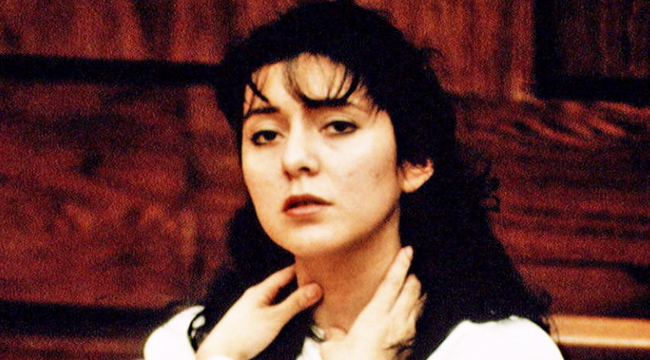
Jordan Peele, for lack of a better term, is enjoying a moment, although I dislike describing the situation in that way. A literal moment would imply that his directorial and screenwriting prowess, as demonstrated in the phenomenally resonant Get Out, is fleeting or trendy. Hopefully, that’s not the case, for Peele has proven himself to be adept at digging into the psychological and thought-provoking aspects of how society reacts to atrocities. With Get Out, and likely with his followup, Us, Peele wields his satiric take on horror as a reflective societal mirror, much like the great horror masters of decades past. His interest in the “whys” is likely what led him to executive produce the Amazon docuseries about Lorena Bobbitt, who infamously removed her husband’s penis in 1993.
The horror of losing one’s penis of the worst things that men can imagine, right?
So, it’s easy to see why Peele was attracted to Lorena, 25 years after “Bobbitt” became a pop culture punchline in 1993. The time was also ripe, especially with the #MeToo movement, to dig into the physical and emotional abuse that caused Lorena to “snap” and commit such a visceral act, along with showing how her story — and the followup battle of the sexes — still remains scarily relevant today. A possible issue, though, is that Peele has his hands in a lot of pots right now. There’s Us (directing), The Twilight Zone (hosting and executive producing), and Weird City (producing), to name the bigger titles. Lorena isn’t a total success, but it’s not a failure, yet one would have never guessed that Peele was involved, if his name wasn’t all over the thing.
With that said, the four episodes feel very disjointed and scattered. The series doesn’t demonstrate a cohesive vision, although it does make repeated mention of how poorly Lorena was treated not only by John Wayne Bobbit but by the court system and society. The series also does alright with following up on the chain of literal events — both husband and wife were cleared of criminal wrongdoing, yet he went free, and she remained in custody for a lengthy mental evaluation — as well as hammering away at a sensationalized summation of the story: “This was a modern love story. Boy meets girl. Boy falls in love with girl. Boy marries girl. Girl cuts off boy’s penis.”
The problem, mostly, is that Lorena runs a full 4+ hours. That’s excessive, and a great deal of time is wasted. It’s unclear why at least 75% of the runtime is swallowed up by talk show clips, vintage interviews, and public reactions from the 1990s that have aired elsewhere. Yes, those clips are new to a great deal of the target audience, but one of the implicit promises of a documentary is access that one won’t get elsewhere. Instead, maybe one-quarter of the series presents compelling fresh information, and within such a crowded TV landscape, overstuffing a docuseries with unnecessary retreads creates a huge barrier to people wanting to stick with all four episodes.
Ideally, Lorena would revolve less obsessively around the wall-to-wall media circus that surrounded two criminal trials (which people still remember) and more around a domestic violence victim finally getting to tell an unfiltered story, long after she described both herself and John as victims during a televised interview. John’s perspective, decades later, is useful, too. These things happen, but the series doesn’t achieve a smooth flow. Much of that is due to that retreading that takes away from the new information that the series offers. The final product — a swirling sea of clips with occasional nuggets of insight — produces a disorienting effect, which distracts from the new interviews of Lorena and John, along with family members and medical and legal professionals.
Perhaps the discombobulation is an intended byproduct, but there’s a missing followup angle that could have been illuminating. Multiple times, we see talk-show-era Geraldo Rivera raging about Lorena cruelly throwing the penis into the yard after removal. We also relive Howard Stern hosting John to talk about his reconstruction, his budding porn career, and “crazy” Lorena. There’s no followup with either of these public figures. In particular, Stern’s softened shock jock persona and his relatively newfound reflectiveness while conducting and granting interviews could have provided a welcome addition for a 2019 docuseries. Does Stern harbor any regrets for contributing to the framing of a domestic violence victim as a loon? That’s an important interview that needs to happen, somewhere, but it doesn’t surface in Lorena.
This also feels like a lost opportunity for Peele and Amazon to explore the enduring horrors suffered by abuse victims. Little has changed since 1993 in that regard (women, particularly immigrants like Lorena, are still afraid to call the police), and that sentiment doesn’t receive enough emphasis. We hear about how Lorena eventually found strength in her society-imposed struggle, and John went nowhere but further down. Yet there’s not enough consistency there to connect with either of them or frame them as archetypes as part of a lesson or a cautionary tale. Lorena has no problem laying out facts, but it offers no insight on how to process atrocities and avoid them in the future. The Bobbitt case is a valuable story to revisit, but this approach isn’t a game changer.
‘Lorena’ is currently streaming on Amazon Prime.






